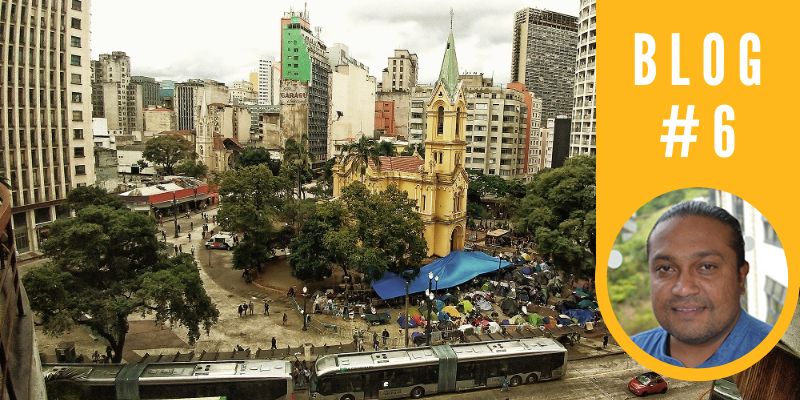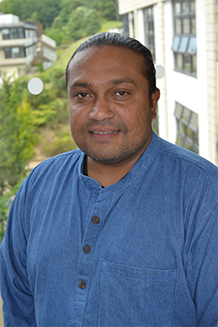Humanitarian crises and responses to environmental hazards - Emergencies, wellbeing, and social justice in the Anthropocene
Janaka Jayawickrama shares with us his empirical experiences of humanitarian crises and responses to environmental hazards in the sixth blog in this series based on the IGDC/YESI Webinar event ‘Emergencies, wellbeing and social justice in the Anthropocene’

In this Blog series we will hear from the panellists that took part in our webinar entitled ‘Emergencies, wellbeing and social justice in the Anthropocene’ which was made up of three sessions discussing: 1) Epistemological perspectives 2) Empirical experiences 3) Future scenarios. This blog accompanies the YouTube videos available in English and Portuguese.
Janaka Jayawickrama’s work on community wellbeing has influenced the global humanitarian and development system and changed response policies to acknowledge communities as first responders. Janaka joined us in this webinar to discuss empirical experiences of humanitarian crises and responses to environmental hazards.
Humans are becoming less and less important to the planet
Contact us
Interdisciplinary Global Development Centre
igdc@york.ac.uk
01904 323716
Department of Politics and International Relations, University of York, Heslington, York, YO10 5DD, UK
Twitter
Suppose all the insects or birds on earth suddenly vanished. In that case, it is highly possible that ecosystems and human civilization would seriously struggle to exist, we would have less food, less resources, and more pollution to deal with. However, if humans on earth suddenly vanished, we can easily imagine that the rest of nature would flourish.
The reality is that human beings are becoming less and less important on this planet. Over the past centuries we have become disconnected from our planet through intense human activities such as urbanisation and technological advances, mainly through philosophies and sciences emerging from Europe and North America. These are the same philosophical approaches and sciences that have been employed to colonise, loot, and destroy societies in Asia, Africa, Americas, Australia, and the Middle East.
The mechanisms that harm the planet are the same as those we expect to fix it
Contemporary science and technology, which is essentially part of mainstream development, is expected to solve problems such as flooding, drought, earthquakes and even the risks of climate change. Instead, science and technology contribute to increased risks, for example, land use expansion increases flooding and earthquake risks are increased by fracking and oil explorations.
We cannot address these challenges and issues alone through physical agreements or material development. We have seen enough evidence that Euro-American philosophies and sciences are insufficient to create a human community that can live in awareness and harmony with the environment.
Action to address crises
To deal with humanitarian crises and environmental hazards, we are taking two levels of action, as we speak. In the short term we are trying to protect and improve the topsoil by organising masses across the globe. In the long term we are pushing for decolonization of the mind through innovative, creative, and critical education systems, development and establishing equal global agendas.
In 1974, 48 years ago, the UN General Assembly adopted the Resolution (A/RES/S-6/3201) that was developed by the Non-Aligned Movement, the Group of 77 and the UN Conference on Trade and Development that the resolution was based on. This Declaration on the Establishment of a New International Economic Order calls for: equity, interdependence, common interest, and cooperation among all states, irrespective of the economic and social systems.
Correcting inequalities and redressing existing injustices makes it possible to eliminate the widening gap between developed and developing countries and ensure steadily accelerating economic and social development and peace and justice for present and future generations. These sentiments hold true to this day.
Checkout the full version of Janaka’s talk and the other panellists in Session 2 via YouTube, as well as the other sessions:
Introduction ENGLISH
Session 1 Epistemological perspectives
Session 2 Empirical experiences
Session 3 Future scenarios
Final Summary Session
Introdução PORTUGUES
Seção 1 Perspectivas epistemológicas
Seção 2 Experiências empíricas
Seção 3 Cenários Futuros
Seção final - Síntese
| Featured Researcher | Janaka Jayawickrama |
|---|---|
|
|
Trained in India, the USA and UK as a social anthropologist, Janaka has been actively engaging in disasters, conflicts, and uneven development crises in Asia, Africa, and the Middle East since 1994. He has led and contributed to several responses including the 2004 Asian tsunami, Western Darfur in Sudan, Northern Iraq, Syria, and Ukraine. Janaka’s pioneering work on community wellbeing has influenced the global humanitarian and development system and changed response policies to acknowledge communities as first responders. Over the years, Janaka has designed many postgraduate educational programmes, including the MSc in International Humanitarian Affairs at York. As an academic and practitioner, Janaka continues to advance the global humanitarian and development system on disaster risk reduction, conflict transformation, climate change adaptation, and community-owned development. |
Contact us
Interdisciplinary Global Development Centre
igdc@york.ac.uk
01904 323716
Department of Politics and International Relations, University of York, Heslington, York, YO10 5DD, UK
Twitter
